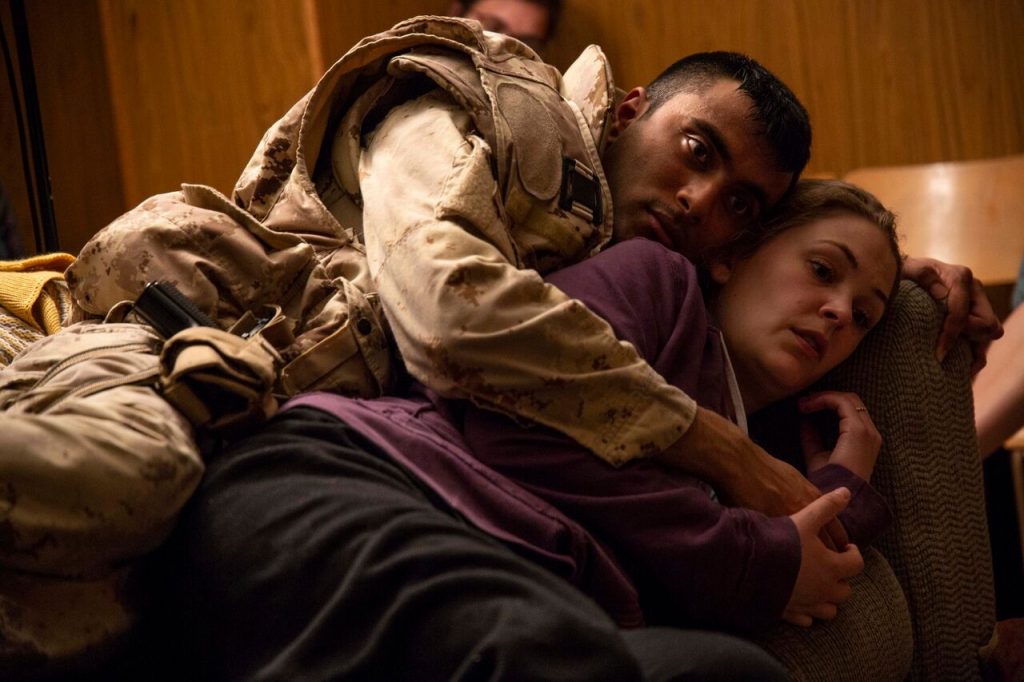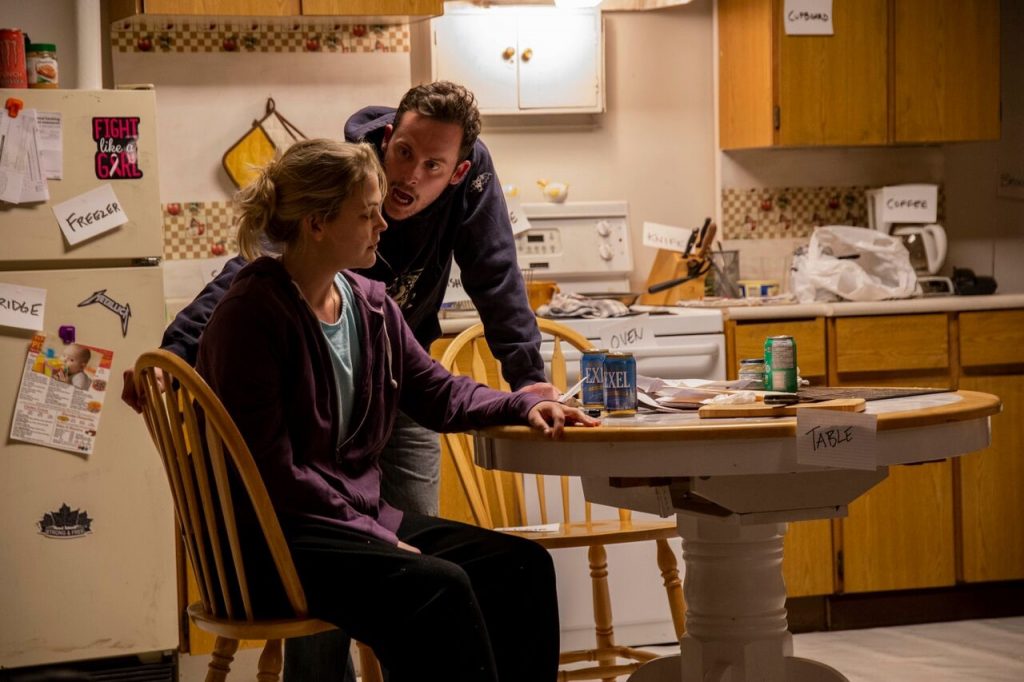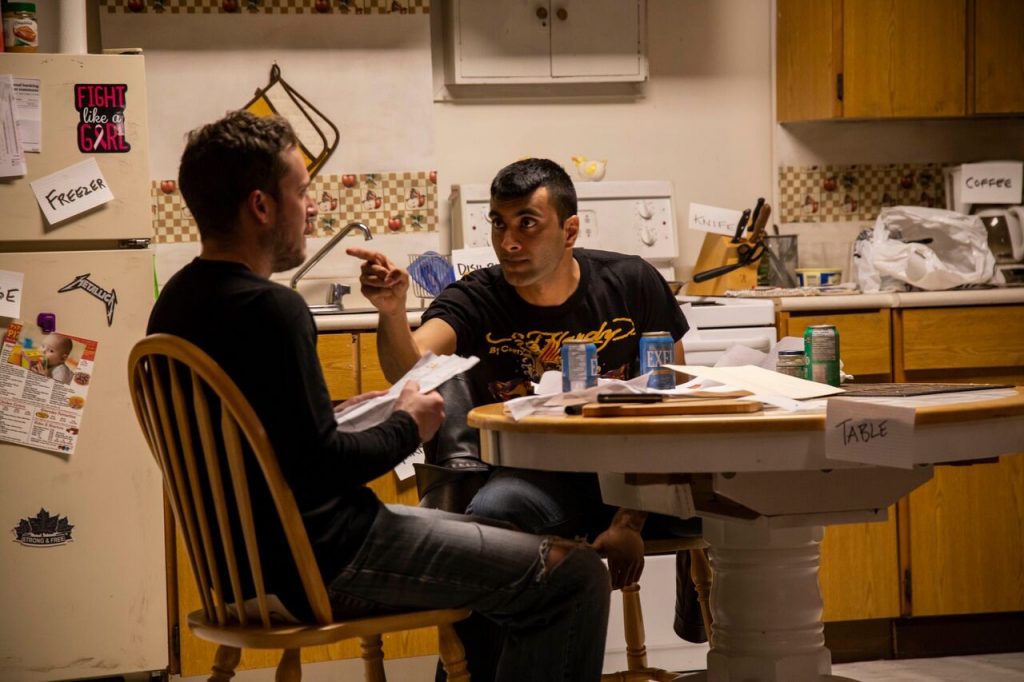
Credit: Matt Reznek
At the Russian Hall until May 27, 2018
Tickets from $25 at theatrewire.com
Posted May 12, 2018
ITSAZOO Productions is in-your-face theatre. There’s no getting away from it. And it can be scary. Remember Killer Joe in the trash-filled trailer parked in the Italian Cultural Centre lot? Or the Competition Is Fierce in The Shop on East 2nd? Blood on the floor. Sit too close and you might get some on you?
Well, there’s blood on the floor again in WET, written by David James Brock, and bravely, sensitively directed by Chelsea Haberlin.
Set during the Afghanistan War, WET is the story of Burns (Genevieve Fleming), a wife, mother and solider in the Canadian Armed Forces. The money is good but being away from her husband Michael (Matthew MacDonald-Bain), whom she calls Sweetie, and baby Cara is bad. For twenty-minutes each week in a tented bunker referred to as the BAT (big ass tent) the troops are allowed a ‘conjugal’ visit via Skype. The guys ask for ‘hot’ images from their women back home but Burns teases Sweetie and strips off her shirt for him. She tells him, “You know, I touch myself at night”. She’s been away a month.

Credit: Matt Reznek
The sound of planes overhead and bombs dropping in the distance punctuates their conversation. As conjugal visits go, it’s the pits.
ITSAZOO walks us down the stairs to the windowless basement of the Russian Hall where designer Jenn Stewart takes us (twenty-eight or thirty of us) into that claustrophobic big ass tent where Burns is Skyping Sweetie on a laptop. Interrupting her is impatient Tom (Praneet Akilla), a hyped-up guy who finds, when it’s his turn at the laptop, there’s no one there for him. His girlfriend, it seems, has given up on him. All there is at home is his cat, Commander. There’s a screw loose somewhere in Tom but he’s the closest thing to a friend Burns has.
In this opening scene Burns is strong, tough and physical. She walks around the tent as if she owns it. She’s afraid of nothing.
In the next scene we leave the BAT and go down a hallway into Burns and Sweetie’s basement suite in Chilliwack. To say more would be to reveal a big surprise – make that a big nightmare. The tip-off is that everything is labelled: STOVE, FRIDGE, DOOR, TV, etcetera. Bad news.
Fleming is amazing in what amounts to two roles: one in good working condition, the other, broken. Fleming has obviously done her PTSD homework.
Our hearts bleed for Sweetie as MacDonald-Bain shifts gears from sweet and understanding to what damned near amounts to a rape. Only those who have been through a situation like this can truly understand how difficult it must be. MacDonald-Bain makes it painfully clear as he frenetically races around the cluttered, windowless suite which is all they can afford.

Credit: Matt Reznek
Akilla is the scary one. As Tom, he’s clearly come unhinged and, yes, there will be a knife and blood and a gun. And, yes, we are all in the front row.
While WET is about Burns, Sweetie and Tom, the playwright’s pen – mightier than the sword, remember – is aimed at Veteran Affairs Canada and the Office of the Judge Advocate General who mete out pensions, benefits and services. It also brings into question the recruiting process: who is acceptable and who is not. Burns, apparently, withheld information and went to war. Sweetie told the truth, was rejected and became a stay-at-home-dad with the baby. Tom, who says all you need is a trigger finger and a valid driver’s licence, was accepted. Pretty damned arbitrary.
WET is the way Burns and Sweetie refer to their mental state. DRY is good, WET is bad. But it also refers to their state of sexual arousal. Sweetie masturbates and watches porn. Burns just masturbates.
Some interesting lighting effects by Conor Moore and authentic costumes by Chantal Short.
WET is not pleasant theatre; you will not have a good time. But you will think twice when you hear about what soldiers face in the so-called ‘arena’ (as if it’s some hockey game) of war. What they witness. What they are asked to do. And then how they are compensated – as if that’s even possible – when they return. How do you put a dollar value on a broken life?
Bad war. Good theatre.

